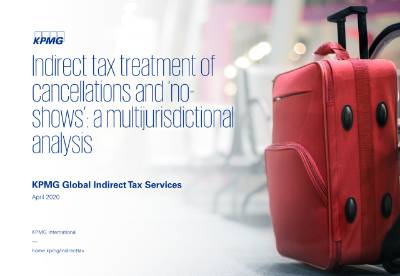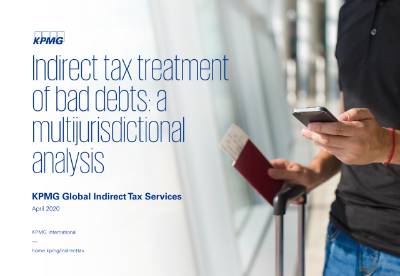Indirect tax treatment of cancellations and ‘no-shows’: a multijurisdictional analysis
The current challenges that societies and businesses face around the world in light of the Novel Coronavirus (COVID-19) pandemic are significant and unprecedented. The extent of disruption to everyday life is unparalleled, leading to widespread cancellations, ‘no-shows’ and other forms of disruption and/or interruptions to events, conferences, bookings, subscriptions, and many other forms of contractual undertakings.
Clearly the impact is most widely publicized in areas such as the travel sector, but it extends well beyond this. Whether it’s a membership subscription which is affected, an event or conference booking which cannot proceed, a construction contract which is delayed, or even a contract to provide goods or services which cannot be fulfilled - the breadth of impact is significant.
Each of these cases raise specific and oftentimes complex or uncertain indirect tax implications in different jurisdictions around the world. Indeed, KPMG indirect tax professionals have identified that differing implications often arise depending on the precise circumstances – the outcome can be affected by the terms of the contract, the nature or description of the fee or charge imposed in response to a cancellation or ‘no-show’ event, or the specific legislative provisions in place in each jurisdiction’s indirect tax system.
The summary tables found within the document below seek to provide high level guidance on the indirect tax position and impacts in each jurisdiction. Importantly, what they highlight is the differing nature of the indirect tax treatment around the world, and in particular, raises key issues for policymakers such as:
- The extent to which indirect tax systems should seek to tax revenue from unfulfilled supplies in the form of cancellation fees, damages payments or liquidated damages; and
- The nexus which may be required between the receipt of income and the performance of certain services which still take place despite a supply being unfulfilled (such as the taking of a booking, or the setting aside of stock, or a reserving a seat at an event, on a flight, or a room in a hotel).
It is important to recognize that the information provided in the below document is high-level guidance only – as noted, these are often contentious issues in many jurisdictions. The specific impacts will always depend on the individual circumstances involved. Specific professional advice should always be sought, and no decisions or actions should take place based on the general information provided here.
Indirect tax treatment of bad debts: a multijurisdictional analysis
The current challenges that societies and businesses face around the world in light of the Novel Coronavirus (COVID-19) pandemic are significant and unprecedented. The extent to which businesses and consumers will fall into default and be unable to settle debts on a timely basis is expected to grow significantly, even despite exceptional levels of government stimulus, subsidies and other forms of support.
In most jurisdictions, businesses which are registered and account for VAT/GST (and other similar forms of indirect taxes) on an accruals basis will often be required to account for output tax in the same tax period as an invoice is issued to a customer. If that invoice is not paid and a bad debt arises in a subsequent tax period, then potentially the business will either have to absorb that VAT/GST as a real cost, or alternatively, they will be entitled to ‘write back’ the VAT/GST previously accounted for. The extent and administrative ease with which the VAT/GST previously accounted for may be effectively reversed may give rise to either permanent or cash flow impacts for affected businesses. Given VAT/GST is levied on gross revenue, any irreversible VAT/GST liabilities arising from bad debts could have a crippling impact on businesses.
From a policy perspective, there are really two main schools of thought around the treatment of bad debts. On the one hand, those jurisdictions which do provide bad debt relief implicitly recognize that businesses should not be required to ultimately bear VAT/GST in circumstances where the business does not receive the related income. On the other hand, those jurisdictions which do not provide bad debt relief seemingly believe that government should not be required to contribute back its tax revenue due to the default of another party. In between these two extremes lies a range of jurisdictions which impose significant conditions around proof of the irrecoverability of the debt before the VAT/GST may be reversed, including limitations where a debt has been sold or factored.
Recognizing the importance of these issues and the differing treatments across the world, KPMG member firms have contributed these summary tables found within the below PDF to provide a quick snapshot for multinational businesses on the impact of VAT/GST and other similar forms of indirect taxes on bad debts. It is hoped that by doing so, jurisdictions which either do not provide relief for bad debts, or impose cumbersome processes or administrative conditions, may recognize the importance of considering changes to their indirect tax systems.
The below document contains high level guidance only. The specific impacts will always depend on the individual circumstances involved. Specific professional advice should always be sought, and no decisions or actions should take place based on the general information provided here.
Connect with us
- Find office locations kpmg.findOfficeLocations
- kpmg.emailUs
- Social media @ KPMG kpmg.socialMedia
Stay up to date with what matters to you
Gain access to personalized content based on your interests by signing up today



